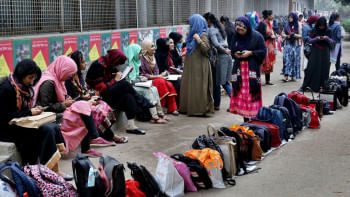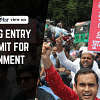What would raising the age limit for govt jobs mean?

The debate on raising the age limit for government job recruitment in Bangladesh seems never-ending. After numerous petitions and movements by jobseekers, the Ministry of Public Administration has finally submitted a proposal to raise the entry age to 35 years and the retirement age to 65 years. If this proposal is approved, the long-cherished dream of many to work for the government might come true.
However, for an economy as reliant on human capital as Bangladesh, the question remains: how justified is this decision? While some may rejoice at the extended age, others argue it could worsen the job market.
For decades, the youth has viewed government jobs as the ultimate career destination, either for the job security they offer, the fringe benefits, or the opportunity to work within the system to contribute to national development.
The demand for government jobs often overshadows other career paths. As a result, university students become engrossed in preparing for government job exams in their final years of study. It is not uncommon to see students from various disciplines abandoning their coursework in pursuit of success in competitive exams. In this context, the decision to raise the age limit could be seen as a positive change, as it may provide these students with enough time to both complete their education and develop additional skills, knowing they have more time to prepare for government jobs.
For students from rural or underprivileged areas, who often face delays in completing their higher studies due to systemic shortcomings, this policy could be a fair and equitable solution. The extended age limit might give them a chance to compete on a more level playing field, allowing their hard work to finally bear fruit in the form of a secure government job.
If the policy encourages more individuals to wait for government job openings rather than seeking alternative employment, the private sector, which is crucial for national economic growth, may struggle to attract talent. This stagnation could discourage entrepreneurship and innovation, both of which are vital for driving the economy forward.
However, this move overlooks the deeper structural issues that plague the job market in Bangladesh. The imbalance between the supply and demand for government jobs has always been significant, as the number of positions in public service remains limited. Increasing the age limit does not address this fundamental mismatch. With the extended age limit, more people will apply for government jobs, leading to a surge in applications each year. Many may choose not to pursue private sector employment in hopes of securing a government position before they turn 35. Thus, increasing the number of older applicants could overwhelm the system, further crowding out younger graduates who are just entering the workforce. This could lead to a vicious cycle, where young graduates are continually added to the unemployment list, lacking the preparation needed to compete with their older counterparts.
Besides, the question remains as to whether those who ultimately do not secure a government job by the age of 35 will be able to transition into the private sector. Even if they manage to do so, how will they fare in terms of skills and competitiveness compared to their contemporaries who have already been active in the job market?
Bangladesh is already grappling with a serious youth unemployment crisis. Many university graduates are unable to find jobs, either due to a lack of skills or a shortage of opportunities. Raising the age limit for government job recruitment may not solve this underlying issue. The real problem lies in the scarcity of job creation, the mismatch between available skills and the market demand, and an unhealthy reliance on government jobs as the primary avenue for secure employment.
If the policy encourages more individuals to wait for government job openings rather than seeking alternative employment, the private sector, which is crucial for national economic growth, may struggle to attract talent. This stagnation could discourage entrepreneurship and innovation, both of which are vital for driving the economy forward.
To foster sustainable economic growth and alleviate youth unemployment, Bangladesh must implement a comprehensive strategy that prioritises education reform, skill development, and job creation. Reforms must prioritise job creation in industries with high growth potential, such as information technology, manufacturing and agriculture. Encouraging entrepreneurship, reducing bureaucratic obstacles, and fostering a more business-friendly environment can help absorb the growing number of jobseekers. Diversifying employment opportunities is also essential for a sustainable economic future. Furthermore, targeted investments in skill development programmes can bridge the gap between education and employment. By providing access to vocational training and on-the-job learning, Bangladesh can equip its youth with the practical skills required to succeed in various sectors.
Samira Tasnim is research associate at the Bangladesh Institute of Governance and Management (BIGM).
Views expressed in this article are the author's own.
Follow The Daily Star Opinion on Facebook for the latest opinions, commentaries and analyses by experts and professionals. To contribute your article or letter to The Daily Star Opinion, see our guidelines for submission.

 For all latest news, follow The Daily Star's Google News channel.
For all latest news, follow The Daily Star's Google News channel. 








Comments